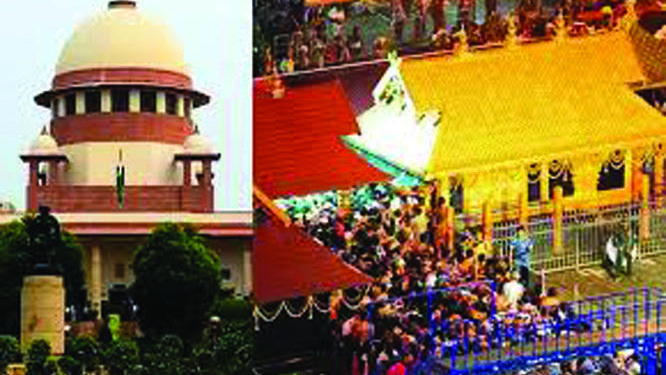NE LEGAL BUREAU
NEW DELHI, JAN 13
The Supreme Court of India to begin hearing pleas on Sabarimala temple issue on entry of women in the 10-50 age group from today.
Curative petitions of two of the four death row convicts in the 2012 Delhi gang-rape case are also will be taken up by the apex court for hearing this week.
A nine-judge bench headed by the Chief Judge S.A. Bobde will on Monday start hearing the petitions related to Sabarimala. The Supreme Court had in November referred pleas seeking a review of its September 2018 order allowing the entry of women of all ages into the ancient Sabarimala temple to a larger bench. In a majority 3-2 verdict, the court had said that gender-based restrictions on the entry of women were not limited to the hilltop shrine in Kerala, but were also prevalent in places of worship belonging to other religions.
In November, the court said the larger bench will re-examine the Sabarimala issue as well as those related to the entry of women into mosques, and the denial of access to fire temples for Parsi women who marry outside the community. It was to also rule on the practice of female genital mutilation among Dawoodi Bohras.
In 2018, the Supreme Court allowed women of all ages to pray at the temple. It upheld the right to equality of worship and triggered protests in Kerala, where traditionalists contend that the entry of female worshippers of childbearing age into the sanctum sanctorum in Sabarimala is sacrilege because Lord Ayyappa, the presiding deity, is celibate.
On Tuesday, a five-judge bench will hear the curative petitions of the gang-rape convicts ,Vinay Sharma, 26, and Mukesh Kumar, 32, filed in the top court on Thursday. Two other convicts on death row in the case, Akshay Kumar Singh, 31, and Pawan Gupta, 25, have not filed curative petitions.
Curative petitions are decided in-chambers by the judges. They are the last legal remedy available to death-row convicts.
The curative petitions were filed when a Delhi court last week issued death warrants against the four convicts and set January 22 as the date for their hangings in Delhi’s Tihar jail. The convicts were given two weeks to file both curative and mercy petitions.
The four were among the six, who gang-raped a 23-year-old student in December 2012 before throwing her out of a moving bus in South Delhi. She died on December 29, 2012, at a Singapore hospital.
In 2017, the Supreme Court upheld the death sentences in the case. Out of the six convicts, Ram Singh, allegedly committed suicide in Tihar Jail. A juvenile was released from a reformation home after serving a three-year term.
It is expected that the apex court would also pronounce its judgment on a petition filed by the National Commission for Protection of Child Rights (NCPCR) against a Calcutta high court ruling restraining the panel from getting involved in the issue of child trafficking in West Bengal since the state commission had already been apprised of the situation.
The Supreme Court will rule on the scope of powers of the NCPCR in dealing with a matter in which a state panel has already initiated an inquiry.









